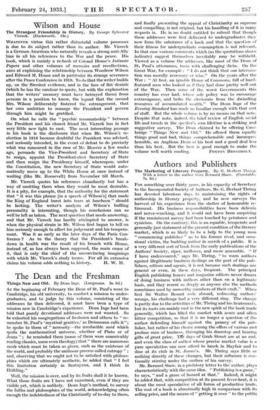The Dean and the Freshman
Things New and Old. By Dean Inge. (Longman. 3s. 6d.)
AT the hegira:ling of February the Dean of St. Paul's went to Cambridge, his old university, to conduct a mission to under- graduates, and to judge by this volume, consisting of the addresses he then delivered, it must have been a type of mission new in Cambridge's experience. Dean Inge had been told, that purely devotional addresses were not wanted. So he exhorted his congregations of freshmen and others to " re- member St. Paul's `mystical genitive,' as Deissmann calls it"; he spoke to them of " necessity—the irreducible surd which spoils the mathematical universe, whether of Plato or of Jeans " ; he reminded them (some of them were conceivably reading elassics,.some even theology) that " there are numerous surds which must be taken as given, such as the existence of the world, and probably the unilinear process called entropy " ; and, observing that we ought not to be satisfied with philoso- phies which are ultimately aesthetic, he added that " I feel this limitation certainly in Santayana, and I think in Well, the mission is over, and by its fruits shall it be known. What, those fruits are I have not examined, even if they are visible yet, which is unlikely. Dean Inge's method, to survey the faiths and philosophies, of the world, acknowledging often enough the indebtedness of the Christianity of to-day to them,
and finally presenting the appeal of Christianity as supreme and compelling, is not original, but his handling of it in many respects is. He is no doubt entitled to submit that though these addresses were first delivered to undergraduates they now form the substance of a book and that the, question of their fitness for undergraduate consumption is not relevant.. In that case various conunents which (as the quotations above indicate) suggest themselves inevitably may be withheld. Viewed as a volume the addresses, like most of the Dean of St. Paul's utterances, teem with challenging dicta. On the Great War, for example : " I do not think that our interven- tion was morally necessary or wise." On the years after the War : " At first, an ignoble House of Commons, full of hard- featured men who looked as if they had done pretty well out of the War. Then sonic of the worst Governments this country has ever had, whose sole policy was to encourage extravagance, and bribe the electorate from the dwindling resources of accumulated wealth." The Dean Inge of the Evening Standard has made us familiar enough with that sort of stuff. But the whole volume is by no means on that note. Despite that note, indeed, the brief review of English social life and trends in the ipeaker's own lifetime is a striking and suggestive survey. The Dean claimed to be offering Cam- bridge " Things New and Old." He offered them equally things good and bad, things comprehensible and incompre- hensible, an Anglican Dean at his best and a good deal less than his best. But the best is good enough to make the






































 Previous page
Previous page